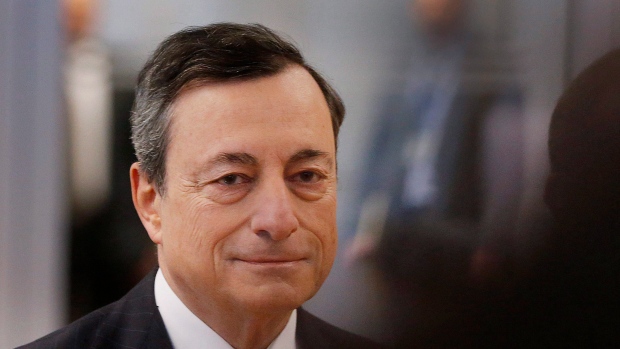Feb 26, 2018
Draghi says ECB needs stimulus persistence amid stronger growth
, Bloomberg News

Mario Draghi said policy makers must remain persistent and patient in providing stimulus even as the euro-area economy’s strong momentum makes the European Central Bank more confident in the outlook for inflation.
The ECB president said in Brussels that the economy is expanding “robustly” on the back of private consumption and investment, while further declines in unemployment and a pickup in wage growth should boost consumer-price growth.
“We anticipate that headline inflation will resume its gradual upward adjustment, supported by our monetary policy measures,” Draghi told lawmakers at the European Parliament. “At the same time, uncertainties continue to prevail.”
The ECB chief singled out the recent volatility in financial markets, including in the exchange rate, which he said deserves close monitoring with regard to its possible implications for price stability.
The comments signal Draghi wants policy makers to move cautiously toward ending their bond-buying program, which is currently scheduled to run at least until September. While the euro-area economy is enjoying its fastest expansion in a decade, data this week will likely show inflation continues to undershoot the ECB’s target of just below 2 per cent.
Draghi’s last public appearance before the next policy meeting on March 8 comes as officials are preparing a shift in policy language, potentially in the first half of the year. Some policy makers already wanted at the last meeting to drop a pledge that the bond-buying program might be expanded.
Speaking in New York on Friday, Executive Board member Benoit Coeure said the ECB can afford to slow its bond purchases, as long as it gives clear guidance over the path of interest rates. Officials currently plan to keep borrowing costs unchanged “well past” the end of their net asset purchases.
Draghi’s opening remarks made no mention of the crisis engulfing Latvia, where central bank Governor Ilmars Rimsevics is facing government pressure to quit after being detained and released on bail by anti-graft authorities. The message from the ECB has so far been that it doesn’t have enough information to assess the situation.
--With assistance from Alessandro Speciale Jana Randow Zoe Schneeweiss Maria Tadeo and Catherine Bosley